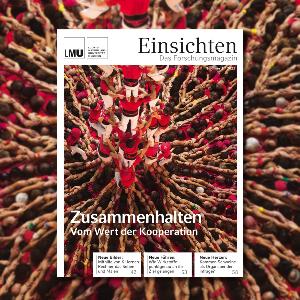Cohesion or division
12 Jun 2023
LMU social psychologist Mario Gollwitzer looks at what pushes people apart and what binds societies together. A portrait from the research magazine EINSICHTEN.
12 Jun 2023
LMU social psychologist Mario Gollwitzer looks at what pushes people apart and what binds societies together. A portrait from the research magazine EINSICHTEN.
Sober language, sobering result: “Two thirds of citizens think that social cohesion in Germany is in bad shape.” Polling institute Infratest Dimap published this finding in November 2022. While social psychologist Mario Gollwitzer thinks that a survey result like this contains a warning, he cautions against overinterpretation. Interpreting people’s responses to survey questions can be difficult in his view. The mere act of asking people about social cohesion can set a mental process in motion: “Am I one of the people who see division? Or am I in the other camp?” And already the respondent assigns themselves to a group and distances themselves a little from another.

Read the latest findings on holding things together in the current issue of our research magazine EINSICHTEN at www.lmu.de/einsichten. | © LMU
Positioning oneself in a specific place in society and identifying with others is a profound human need, at all times and everywhere in the world, observes Gollwitzer: “Belonging somewhere, being part of a group – and getting the feedback: ‘You are one of us’ is something we all strive for.” Against the background of this universal human need, social psychologists like Gollwitzer look at what connects and divides people, and what stabilizes and unsettles societies.
Alongside the need to identify with a group, social psychology has defined further basic needs of people in modern societies. These include the feeling of being able to make free and autonomous decisions. Moreover, many people find it difficult to live in a world that is unstable and unpredictable. And the need to be able to foresee what is coming has hardly been satisfied in recent years, says Gollwitzer: “Upheavals such as the Covid-19 pandemic, the climate crisis, and war always threaten our striving for stability, order, predictability, and control.” At the same time, the LMU researcher observes that people’s propensity to think in stereotypes is much stronger than in previous decades.
Naturally, there has always been social division on many issues. In the 1980s, for example: “Are you for or against NATO rearmament? Are you for or against nuclear energy?” But since then, says Gollwitzer, “society is increasingly thinking of individuals as members of opposing groups, parties, or blocs: right and left; contrarians and mainstream; Gen Z and boomers; Last Generation and SUV drivers.” Communication through social networks is playing a part in this: “A limited number of characters does not allow for much complexity,” says Gollwitzer.
Upheavals such as the Covid-19 pandemic, the climate crisis, and war always threaten our striving for stability, order, predictability, and control.Mario Gollwitzer
At the same time, he has observed a stronger tendency for people to see themselves as victims. He wants to dig deeper into this phenomenon with his colleague Karsten Fischer from the Geschwister Scholl Institute of Political Science at LMU. In a research project, they are investigating something that American sociologists Bradley Campbell and Jason Manning captured in the title of their book, The Rise of Victimhood Culture. That being said, Gollwitzer finds the English expression ‘victimhood culture’ somewhat problematic. In his view, the concept of a ‘victimhood culture’ or even of a ‘victimhood cult’ severely abridges the complexity of the phenomenon behind it. What interests him in particular is the question as to how exactly such a cultural transformation – if indeed it exists – is represented in the minds of individual people. Their working hypothesis: If such a ‘victimhood culture’ really exists, then individual sensitivity to injustice must also have increased over the past 20 years. Gollwitzer and his team want to discover whether there are any empirical indications of this.
Specifically, how do victimhood narratives shape the political landscape in Germany, and how are attitudes changing? To find out, the researchers are going through party manifestos and platforms of the past five federal elections and analyzing the texts of all parties. Gollwitzer hypothesizes that victimhood narratives are more common on the political fringes than in the center. And initial findings are pointing in this direction.
The message “My group is being disadvantaged, dominated, oppressed by other groups” can only resonate, however, if people are receptive to such ideas. And here Gollwitzer has long been investigating what social psychologists call “injustice sensitivity from the victim’s perspective” – or “victim sensitivity” for short. “These are people who go through life with a sort of inbuilt alarm system and think that the danger of being exploited, deceived, and mistreated lurks behind every corner.” People with this alarm system are particularly susceptible to victimhood narratives.
Surveys are useful for identifying a particularly pronounced ‘victim sensitivity,’ according to Gollwitzer, although it is important, he notes, to formulate the questions in the least suggestive manner possible. For example, researchers can ask people whether they agree with statements such as: “When I’m treated worse than others, I tend to brood over the unfairness.” Or: “It rankles with me when I see that other people are favored and I am disadvantaged.”
Society is increasingly thinking of individuals as members of opposing groups, parties, or blocs: right and left; contrarians and mainstream; Gen Z and boomers; Last Generation and SUV drivers.Mario Gollwitzer
However, the question “Am I being treated fairly” is bound up with a further question: “What is fair?” And there is no clear answer to this question. When a resource is to be distributed among individuals, for example, there are several principles that can be applied, each of which have their own justification. One of these principles is equality: Everybody gets the same share of the resource. An example would be the flat-rate energy allowance for students in Germany, which was the same for everybody, regardless of whether their parents were millionaires or welfare recipients.
A second principle is to give everybody what they need. For example, students who come from a wealthy background may receive a lower heating allowance than those who do not. A drawback of this principle is that need always has to be assessed, which can be pretty difficult. A third principle is equity. In the German pension system, for instance, it is considered fair that a person who has made more contributions subsequently receives a higher pension, irrespective of whether they really need high pension payments after a working life on a high income.
Politics, according to Gollwitzer, is basically the attempt to negotiate between these principles: “Sometimes, these three principles of fairness logically exclude each other.” The equality principle contradicts the principle of need. And both of them contradict the contribution principle. Therefore, politics always means deciding and re-deciding which fairness principle should apply to which domain in which form, while making compromises along the way.
In this context, politics needs to come to terms with some basic insights from social psychology, says Gollwitzer. One phenomenon that has received scholarly attention in that regard is the “fixed-pie bias”: People tend to incorrectly assume that the amount of resources that can be shared necessarily has a fix upper limit. Which would mean that if new groups want a piece of the pie, then established groups would get smaller pieces.
By this logic, satisfying the additional needs of certain population groups would be possible only by giving less to other population groups. Offering immigrants the possibility for a good life, for example, could be accomplished only at the expense of those already living in the country. Or guaranteeing a growing number of retirees a good life would be possible, according to the fixed-pie view, only by disadvantaging the working population.
But what people often fail to realize is that in an economy with constantly growing productivity and economic output, the pie grows accordingly, observes Gollwitzer. As such, more recipients of the pie sometimes mean that the pie gets larger. “However, this is cognitively more difficult to process than the idea of a fixed upper limit,” summarizes the social psychologist.
There can be scarcely any doubt, he observes, that the fear of losing out in a resource distribution conflict can deepen existing social divisions or even open up new ones. But it would make sense from a social psychology standpoint to continually emphasize the fact that each distribution principle has its own merits and that compromises between them are often a good way of resolving a conflict.
In Russia, for example, where the narrative that the country has to defend itself with violence against external enemies has gained more traction thus far among the Russian population than many people in Western countries had expected or hoped.Mario Gollwitzer
But there is another way to strengthen cohesion, notes Gollwitzer with a sigh: “You can create group cohesion by positing an external enemy.” This can be seen currently in Russia, for example, “where the narrative that the country has to defend itself with violence against external enemies has gained more traction thus far among the Russian population than many people in Western countries had expected or hoped.” At the same time, Gollwitzer says, the Russian war against Ukraine has brought the members of the European Union closer together, at least at the state policy level: “It’s seen as an attack on Western values – on us. And that prompts the EU countries and NATO members to close ranks.”
Achieving cohesion without external enemies and without the hostile othering of out-groups within a society is of course the ideal toward which a civilized country should strive, observes Gollwitzer. But to realize this aspiration, people would have to cope with uncertainty and diversity: “And as strenuous and difficult as that is, I just cannot see any good alternative.”

Prof. Mario Gollwitzer | © Oliver Jung / LMU
Prof. Dr. Mario Gollwitzer is Chair of Social Psychology in the Department of Psychology at LMU. Born in 1973, Gollwitzer studied psychology at Trier University, where he also obtained his doctorate. After that, he moved to the University of Koblenz-Landau, where he headed the Center for Methods, Diagnostics, and Evaluation. After eight years at the University of Marburg, he joined LMU in 2018.
Read more articles from the current edition of "EINSICHTEN. Das Forschungsmagazin" in the online section and browse the issue archive.
Or subscribe to EINSICHTEN free of charge and never miss an issue again.